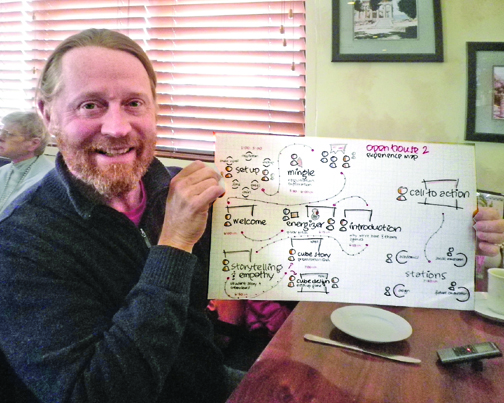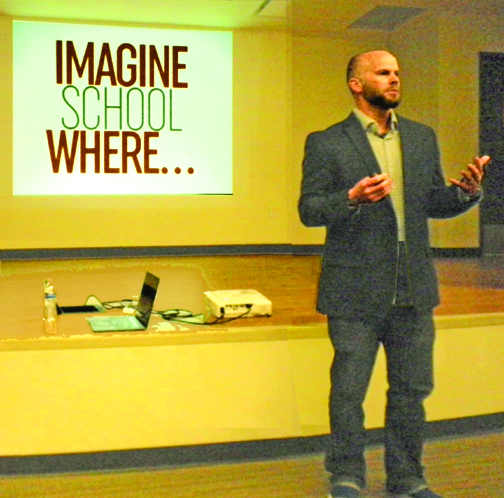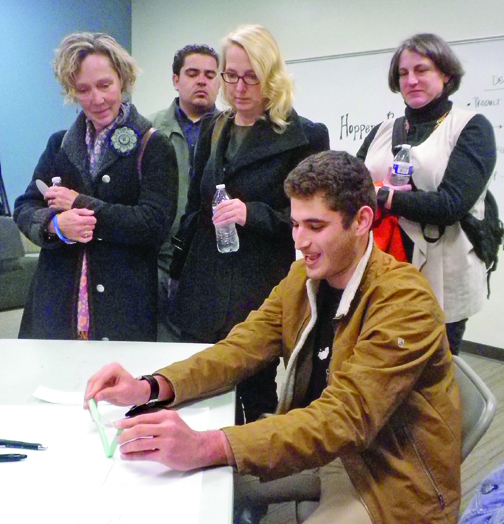The CUBE Focuses On Innovative Learning And Real-World Experiences
by Ruthy Wexler

Co-Founder: Jim Stephens, co-founder of The CUBE, displays his plans for the Open House that was held on January 8, 2018. Stephens hopes to have enough students enrolled by the end of February 2018. The requirement is 93.
The CUBE, a new high school in Denver, is ready to enroll students and eager to explain how their innovative program not only boosts reading, writing, and math skills, but connects students to the real world — and their best selves.
Since Denver Public School’s school choice enrollment takes place February 1-22, The CUBE held a series of Open Houses in January, “so kids and parents could see who we are and what we do.” At the first one, held on January 8 in The CUBE’s temporary home, Vickers Boys and Girls Club, an attentive, curious group began to grasp how profoundly different this school would be.
“But don’t you have … classes?” one mother asked.
“Yes, we have classes,” smiled co-founder Bret Poppleton. “But they’re not what you’re used to. One course students can take first semester is ‘Flour, Water, Salt and Yeast.’”
“They bake bread?” said a puzzled adult.
“Yes. And that’s fun and engaging. But they also learn chemistry, math, research, writing … because all those things are involved.”

Presentation: Bret Poppleton, co-founder of The CUBE, explains CUBE concepts to parents at the Open House. School Choice for Denver Public Schools runs from February 1 to 28, 2018, and CUBE supporters hope to enroll 135 students.
Because It Was Real
“We call our courses ‘mash-ups,’” Poppleton explained. “An interdisciplinary smashing together of ideas that teaches students to think more deeply about the world. It’s actually how real learning happens. Not linear but from all directions. Starts with being engaged.”
He shared an epiphany. “In middle school, I was always complaining, ‘Why do I have to learn this?’ Then, between 10th and 11th grade, I spent a week in construction, building homes. I learned more that week, it seemed, than in a whole year of school. Because it was real.”
The CUBE’s other founder, Jim Stephens, told much the same story. “Between my sophomore and junior years of college, I went to Jamaica, a summer field school for anthropology. At first, I thought, great, a vacation. But doing excavations right there on sugar plantations with descendants of enslaved people, I understood history so deeply. I drew the artifacts, made maps. It all connected. For the first time in my life, learning came alive.”
Based On Research
What happened in Jamaica — what will occur at The CUBE — is “integrated learning,” said Stephens, who honed his educational skills for years before embarking on a “national search for the kind of place I wanted to teach” — and landed at the Denver School of Science and Technology (DSST).
“I learned so much there,” recalled Stephens, whose passionate interest in the swiftly-shifting future was shared by DSST colleague Bret Poppleton.
The more the two learned how the world was changing — how radically different the work force will soon appear — the more they wanted to equip students with the skills to “pivot”; i.e., change direction with confidence.
“First, we needed to understand the teenage brain the same way that Montessori understands the early years,” Stephens recalled. “Studies show, for example, that the brain’s sleep pattern changes markedly during adolescence. That’s why teens fall asleep in early classes. Our classes won’t start until 9 a.m.” [Although The CUBE will stay open from 7 a.m. to 7 p.m.]
Questions
On January 8, impressed parents nonetheless had worries.
“What about standardized testing?”
“Yes, we take them. All our kids will learn to read, write, compute and think, skills absorbed so much more easily when engaged,” said Poppleton.
“Is there homework?”

Demonstration: Abcim Molavi, former student of The CUBE’s co-founders, demonstrated his solution to the Hopper Project as parents look on at the Open House held in January. The Hopper Project is statistical machine learning for advanced search of mathematical and scientific literature.
“Working on a project, doing research, that’s homework,” Poppleton said. “But they’ll love what they’re doing and learn more.”
“What about transcripts?”
“We have a transcript format that includes the traditional information, as well as social-emotional and 21st century skills data.”
“Accountability?”
“We offer fun and engagement, so we expect more participation. But we have expectations too. When students finish one of the mash-up classes, they must do three things: write a paper, create a product, do a presentation.”
Future
Earlier, Jonathan Best, The CUBE’s “Computation Jedi,” had led students to an adjoining room. After an hour, parents joined the kids, who’d been divided into groups and instructed to build “something that moved” from a box of ordinary objects.
“We’re telling them, ‘You’re smart, you can figure out how to build something that moves from these few materials,’” explained Best. “It’s not about competing. It’s building confidence to think outside the box.”
The CUBE’s founders excitedly envision a student body “where every kid knows how to code,” week-long courses “that take place in the real world, like an ice-climb in Ouray,” unlocking “the huge potential inside each child.”
Currently, they’re addressing the challenges of any new school.
“Fundraising. Finding the facility. Getting kids,” listed Poppleton. “We’ve already raised $2.5 million.”
“We’re going to take 135 students,” said Stephens. “Or more. But by the end of February, we have to have 93.”
What if too few sign up?
He smiled gently. “Well… then people aren’t ready for our school.
“But I hope they are. We’re ready for them! We can’t wait to show how powerful storytelling and empathy and mash-up classes are.
“We don’t use the term ‘alternative’ — because we believe all schools should look like this. And will, in the future.
“It’s just that The CUBE is doing it now.”
